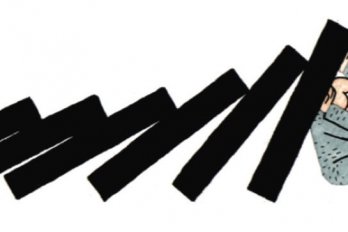When Conservative finance minister Jim Flaherty tables the 2011 federal budget in Parliament in March, it will tell a story, as do all budgets. The plot will be familiar to any homeowner: “We ran into a spell of money trouble [the 2008 credit crisis] and had no choice but to remortgage the house [the 2009 stimulus package]. But now we’re saving diligently, and we’ll pay down that unexpected obligation within five years—certainly well before we retire.” Stephen Harper’s Tories aren’t the sort of party to lug around a balance on the national credit card, or so the messaging goes.
Against the possibility of a federal election, the consensus about the need for belt-tightening in Ottawa is impressive. The next campaign, Liberal leader Michael Ignatieff mused after a recent party event, “is going to be a choice between competing priorities within a context in which we can’t do everything we want.” The Tories have seized the opportunity to project an image of managerial sang-froid (despite massive outlays on fighter jets and super-jails) in the face of what is Canada’s largest-ever shortfall, numerically speaking. As Stockwell Day confidently noted last autumn, the $56-billion deficit is “timely, targeted, and gone.”
The situation is very different, politically and economically, than it was the last time the feds wallowed in red ink. When Canadians stumbled out of the 1991–92 recession, Ottawa’s $41-billion annual shortfall accounted for 6 percent of the national economy—a stunning figure. At the time, recalls Reform Party founder Preston Manning, “there was no public acceptance that deficits were a big problem.” It took populist outrage rising from the West, and the Wall Street Journal warning ominously that Canada was about to hit a “debt wall,” to convince Jean Chrétien’s Liberals that they couldn’t ignore the deficit, as their predecessors had. So they eliminated it, largely in one brutal gesture: Paul Martin’s 1995 budget.
Notwithstanding the Tories’ rhetoric of probity, the current deficit will be far easier to eliminate, even though the numbers look larger. The shortfall has resulted from diminished government revenues, due to the global recession, and a stimulus package designed to inject cash into the economy through one-off infrastructure projects. The fiscal headaches of the early ’90s, by contrast, represented a crisis long in the making: successive regimes in Ottawa had been approving growing structural deficits every year since 1969. The growth of the federal government’s annual program spending, and its payroll, outpaced tax revenues. Interest payments were exploding.
There are other telling differences, according to Casey Vander Ploeg, a senior policy analyst with the Canada West Foundation in Calgary. Relative to the size of the economy, the deficit is about half of what the Chrétien Liberals inherited in the early ’90s. Ottawa’s accumulated debt, in turn, is much lower, thanks to aggressive annual repayment policies initiated by Martin: the debt-to-gdp ratio in 1993 was 75 percent; today, it’s roughly 45 percent. The reality is that Martin had to contend with a far more formidable challenge than Flaherty faces.
Martin finally delivered a tiny surplus in 1999—the first in thirty years—after a lengthy run of downloading and program cutting, and much kvetching from provincial and municipal officials. The Liberals prioritized social spending over significant tax cuts, while the Tories would do the reverse in wake of their 2007 surplus.
Whether Flaherty’s deficit eradication campaign will end as happily remains to be seen. The coming decade, after all, isn’t like the ’90s. With the baby boomers now reaching retirement, pension and health care costs are about to skyrocket. The Conservatives’ tax cuts have eased voter angst about public finance, but, paradoxically, they may keep Ottawa in the red. Parliamentary budget officer Kevin Page warns that the Tories, like the Liberals of old, are ignoring a $10-billion structural deficit—a stickier portion of the otherwise manageable shortfall—which means they’ll eventually have to chop programs or raise taxes.
Most worrisome, though, is the economic tumult that continues to threaten from abroad, like a home invasion gang. The deficit crisis of two decades ago was a made-in-Canada debacle, whereas the current deficit has much more to do with the global economic rut. International uncertainty could wallop the Canadian government’s ability to borrow, irrespective of Flaherty’s orderly march toward the black. “Markets can remain irrational longer than you can stay solvent,” John Maynard Keynes famously remarked.
In short, beware of forward-looking statements—red, blue, or otherwise.
Economy Class
A bank spokesman’s polish belies Europe’s crisis
In his native Netherlands, Shakespearean actor Frederik de Groot is best known as the steely detective Guus Bals from the TV crime drama Bureau Kruislaan. In Canada, he’s more familiar as the “Save your money” guy: since 1997, he has acted as the spokesman for ing Direct, one of the world’s largest online banks. He won the part thanks to his austere demeanour: bland (but tidy) appearance, mild (but not stunning) good looks, and a sober (yet sincere) onscreen persona. The clincher, though, was his trademark European accent: Canadians would recognize in his elocution the foreign roots of his employer, as well as a certain Continental fastidiousness. And if de Groot’s enduring fame is any indication, these associations persist—despite the poor state of Europe’s economies.
—Jonathan Simpson
This appeared in the March 2011 issue.



